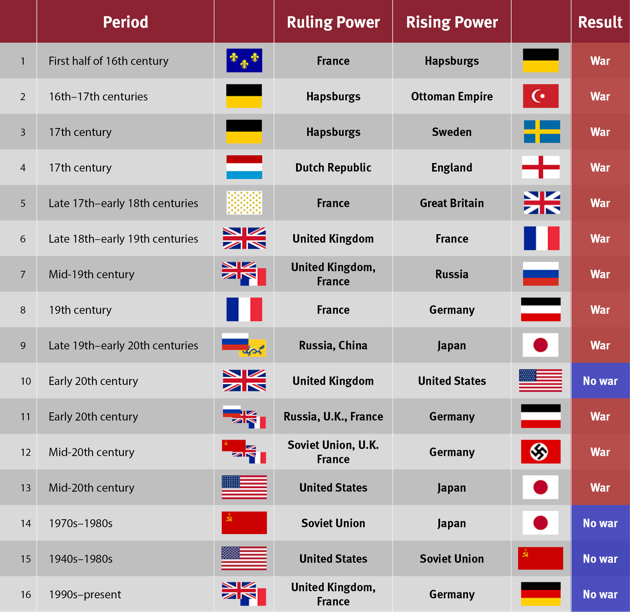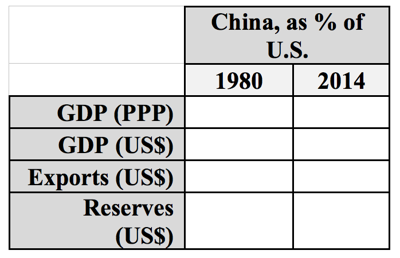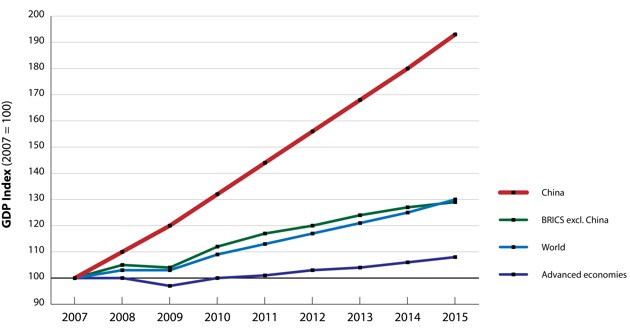- Reaction score
- 6,192
- Points
- 1,260
Part 1 of 2
Not everyone agrees with Ian Bremmer, including Thomas Wright of the Brookings Institution, as he explains in this article which is reproduced under the fair Dealing provisions of the Copyright Act from The American Interest:
http://www.the-american-interest.com/2015/08/14/should-america-power-down/
End of Part 1 of 2
E.R. Campbell said:This article, which is reproduced under the Fair Dealing provisions of the Copyright Act from The Telegraph is about the impact of America's strategic choices on Britain bit it also could be applicable in The Chinese Military, Political and Social Superthread, because there is a lot of focus on Sino-American relations, and even in Making Canada Relevant Again - The Economic Super-Thread, because the choicers which American straegy offers/forces on Britain will be similar to some that those American strategic choices offer or force on Canada:
http://www.telegraph.co.uk/news/worldnews/northamerica/usa/11640302/Exclusive-interview-Ian-Bremmer-says-America-is-no-longer-indispensible-and-thats-bad-news-for-Britain.html
Now, I need to reiterate my well established (I hope) positions:
1. America cannot afford the Indispensable America option; and
2. There is no such thing as "American exceptionalism," so even if America decided to "go for broke" and try to be indispensable there is a very, very good chance that it would fail.
That leaves America with two rational and one irrational choices:
1. Moneyball America, which would be, immediately and directly, bad for Canada but would force us to take advantage of other trade opportunities that might (in my opinion, would) be good in the mid to long term; (rational choice)
2. Independent (Isolationist) America, which would have somewhat less economic impavct on Canada, because America would, likely want to maintain very close economic ties, but might, actually, threaten our sovereignty because the
United States might decide that it needs a continental socio-economic base to prosper; (rational choice) or
3. Incoherent America (what Dr Bremmer and I agree we have now) which means that we need to seek new socio-economic 'partners' in the world. irrational choice
My bet is on 3, 1 and 2, in that order, for the near to mid term, and then 1, for a while, followed by 2, in the mid to long term.
I believe that America has been adrift, strategically, since about 1960. I'm not blaming any one president (not even Kennedy who I think was vacillating and foolish) nor one group (not even the baby boomers) nor even one attitude (not even the deeply flawed belief in American exceptionalism) for America's problems, but the combination of a half century of weak, foolish leadership and flawed (statist) socio-cultural structures has, I fear, fatally weakened our best friend, good neighbour and protector.
Not everyone agrees with Ian Bremmer, including Thomas Wright of the Brookings Institution, as he explains in this article which is reproduced under the fair Dealing provisions of the Copyright Act from The American Interest:
http://www.the-american-interest.com/2015/08/14/should-america-power-down/

Should America Power Down?
THOMAS WRIGHT
Ian Bremmer argues that America should tender its resignation as the world’s superpower. But becoming Clark Kent, permanently, is not sound strategy.
In 1912, many people predicted that the United States would be one of the most powerful states in the 20th century. Its economy was strong and its potential seemingly limitless. But it would have been ludicrous to suggest that within a half-century it would be the dominant resident power in Europe, East Asia, and the Middle East or that in less than a century it would be a unipolar power. After all, on the eve of World War I, German power was ascendant, Britain bestrode the world wearily but still as a Titan, and the United States had little appetite to venture outside its hemisphere.
Of course, the inconceivable happened. The United States became the world’s only superpower because it made better strategic decisions, and far fewer mistakes, than its competitors. Germany destroyed itself twice. Russia imploded and rose again under an ideology that contained the seeds of its future destruction. Britain was pulled into two world wars that sapped its power and forced it into retirement.
The lesson of the 20th century is that strategic choice matters. It is what great powers do geopolitically that makes history, not how much or how fast their economies grow. The contemporary debate on American power has mostly lost sight of this fact. Relying on a couple of crude metrics, like GDP and military spending, experts say with certainty whether this century will be Chinese, American, European, or run by no one at all. It is a little like declaring baseball season over before it begins and awarding the World Series to the team with the largest payroll or highest batting average.
The importance of strategic choice is the starting point for Ian Bremmer’s new book, Superpower: Three Choices for America’s Role in the World. Bremmer, a political scientist and the founder and CEO of the Eurasia Group, argues that the United States will remain a superpower for many years to come. The only question that matters is how it will use its power. Bremmer lays out three options for the United States and makes the best case he can for each. Only at the end does he tell us his preference. The book is written as a “Choose Your Own Adventure” with a gimmicky quiz to boot. But it is actually a manifesto in disguise.
Bremmer’s favored strategy is what he calls “Independent America,” whereby the United States would dramatically reduce its international commitments and pivot to the home front. Defense spending would be slashed and directed to homeland security, and Russia and China would each be allowed a sphere of influence. The United States would stop being the security guarantor of last resort for NATO and Japan, and would withdraw from the Middle East entirely.
Bremmer writes, “It’s time for a new declaration of independence—a proclamation of emancipation from the responsibility to solve everyone else’s problems.” He is exhausted by alliance commitments to defend those who won’t look out for themselves: “Why should Americans lead a fight to defend Latvia or Estonia if Germany, now one of the world’s wealthiest nations, won’t share more of the cost?” “America will be better off,” he says, “if we mind our own business and let other countries get along the best they can.” The United States should not get involved in wars or crises, like Iraq, Afghanistan, Israel-Palestine, and Ukraine, where the others “care more about the outcome than you do.” The superpower must explicitly tender its resignation: “Only a crystal clear signal from Washington that America will now lead mainly by example will force our traditional partners to stand on their own.”
Above all, Bremmer longs for what the United States could do without its heavy burden. “Imagine what might become possible,” he writes, “if we redirected the attention, energy, and resources that we now squander on a failed superhero foreign policy toward building the America we imagine, one that empowers all its people to realize their human potential.” He would slash military spending and shift what’s left away from aircraft carriers and toward intelligence, homeland security, and cybersecurity. With the money saved, he would increase spending on infrastructure, education, veterans’ benefits, and tax cuts. The only time he breaks with the pure version of Independent America, as detailed in an early chapter, is in his support for free trade.
The two strategies that Bremmer rejects, after laying them out in full, are Moneyball America and Indispensable America. The former is, of course, an allusion to Michael Lewis’s best-selling book Moneyball, about Billy Beane and the Oakland A’s. Beane succeeded by jettisoning common baseball practice and using data and statistics to invest in players undervalued by the market. Under this option, Bremmer says, the President should invest in the value of America by making several calculated bets designed to deliver a significant return. However, he believes this will not work; America is not a corporation and cannot behave as if it is one. The U.S. government is simply too big and too complicated to achieve the nimbleness required for moneyball. And corporations make bad bets all the time. In the economy, failure is part of the process of creative destruction. But we can afford less risk when it comes to the nuclear codes.
Indispensable America is the latest iteration of traditional U.S. grand strategy dating back to the late 1940s. Here, the United States will continue to underwrite the liberal international order through alliances, military intervention, the provision of public goods, and an outsized leadership role. But Bremmer believes the U.S. doesn’t have the influence it needs to play this role any more. Even more importantly, he says, the American public is not prepared to play that role, especially if it means going to war with China over some rocks in the South China Sea or fighting Russia over the Baltics. “Indispensable America,” he writes, “was the right strategy at the end of World War II…But we can’t ignore the ways the world has changed.”
Bremmer’s choice, an Independent America, is not isolationist. Indeed, even the isolationism of the 1930s was not truly isolationist, since it allowed for commercial, political, and cultural engagement with the rest of the world. Independent America is, however, strictly non-interventionist. It is the product of what my colleague Robert Kagan has termed a desire to return to normalcy—that notion that the United States does too much as a superpower and should become a normal nation with normal interests.
The idea that the United States must retrench and reduce its international commitments has been percolating in academic circles over the past decade. The most advanced and sophisticated case is Restraint, a 2014 book by Barry Posen, a professor at MIT and perhaps America’s top academic defense expert. Restraint explains in detail why and how the United States should divest itself of its international security commitments and give up the liberal international order. Posen is not an outlier. Retrenchment is the preferred strategy of the majority of security studies scholars, especially in the younger generation of professors. It is the internationalists—William Wohlforth and Stephen Brooks of MIT and John Ikenberry of Princeton University—who are in the minority.
End of Part 1 of 2










